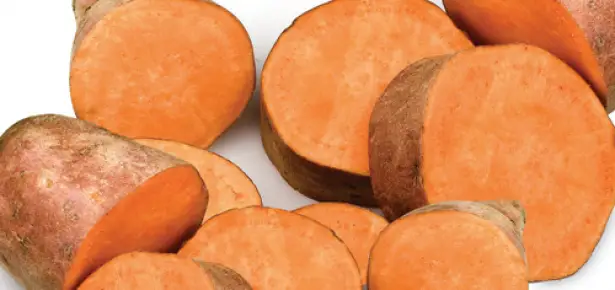Contributing Writer for Wake Up World
Did you know that studies now prove that the chemicals found in sweet potatoes can actually heal stomach ulcers? And not just any type of ulcers – Peptic Ulcers! These are the ulcers that so many people suffer from, which begin as ‘casual’ heartburn. Though there are many causes for the development of peptic ulcers, I think we can all agree that the Standard American Diet (SAD) is certainly a major contributor, along with the unrelenting stress of today’s “hurry it up” lifestyle!
Typically, the treatment of choice for this condition in pharmaceutical medicine is none other than Nexium (esomeprazole) – available by prescription only. Another popular heartburn pharmaceutical is Prilosec – which is even more popular now, since it became available over-the-counter (OTC).
[pro_ad_display_adzone id=”110028″]
Don’t you just love the Prilosec commercial with “Larry the Cable Guy”? He is certainly my choice as a “health adviser” (yep, said with sarcasm!) What does he say? Something like “Americans love their food, so treat frequent heartburn with Prilosec OTC to block the acid that causes it – so you don’t get heartburn in the first place.”
OR…. wouldn’t improving your diet be a better choice?!
More Than Just An Ordinary Spud
A study published in Functional Foods in Health and Disease 2012 set out to find just how effective the anti-ulcer activity in sweet potatoes actually was against peptic ulcers. The results showed the following:
The results of the present study showed that TE possessed gastro-protective activity as evidenced by its significant inhibition of mean ulcer score and ulcer index and a marked increase in GSH, SOD, CAT, GPx, and GR levels and reduction in lipid peroxidation in a dose dependent manner.
This translates to: The sweet potato was very effective!
The researchers concluded:
This study demonstrates that the tubers of Ipomoea batatas possess a potent ulcer healing effect, which appear to be related to the free radical scavenging activity of the phyto-constituents, and their ability to inhibit lipid peroxidative processes. The present study, thus, aims to highlight the health benefits of sweet potato, establish it as a potent “functional food” and promote its use as a vegetable to enrich people’s diets.
By the way, Ipomoea batatas is simply the fancy scientific name for Sweet Potato.
But I hear some of your questions and concerns already:
- “Aren’t sweet potatoes high in starchy carbohydrates?”
- “I am trying to lose weight, so how can I eat them?”
- “I am doing The Paleo diet and some they say “NO” to sweet potatoes”
- “I am diabetic, so I definitely can’t eat them”
- “I am on a low carbohydrate diet, to lower my cholesterol and protect myself from heart disease. I don’t think sweet potatoes should be on my menu.”
Well, those are some awesome questions and I’d love to answer them!
All About Sweet Potatoes
Though sweet potatoes are a starchy carbohydrate, they have something unique that those of you on a low carbohydrate diet AND diabetes will love! A low Glycemic Index (GI). This refers to how fast blood sugar levels rise after eating a certain food.
If a food has a high GI, this means the carbohydrate breaks down quickly and releases high amounts of glucose into the bloodstream quickly, triggering a surge of insulin. This then can quickly cause a drop in blood sugar making you feel fatigued and hungry again. A major issue with this cycle is that it can lead to obesity, diabetes, inflammation and other chronic health conditions.
The bottom line? The lower the GI level, the lower the blood glucose spike and the more sustained is energy released to the body. When using a GI scale, the reference number is 0 to 100, so any food getting close to 100 is considered having a high GI.
And guess what? The sweet potato has a LOW GI! Ranging from 40-50, depending on what source you use. In contrast, the white potato range averages from 60-90.
Even more good news! A recent study done at the University of Agriculture in Pakistan found the properties of the sweet potato may actually help those with diabetes. One of the contributing doctors, Dr. Jon Allen, CALS professor of Food Science said the following:
With further research in this area, it may be possible to recommend that people with diabetes or insulin resistance consume sweet potatoes or use extracts of North Carolina sweet potato to help control blood glucose…
This therapy should cost less than conventional drugs, and it may have fewer side effects…
We’re hoping that diet, particularly the consumption of sweet potatoes, will become a more widely used tool in the treatment of diabetes…It has the potential to be more cost-effective than drugs.
One of the issues with white potatoes (particularly for those who closely manage their blood sugar levels) is that their GI can actually change depending on the cooking methods used. So is that also true of the sweet potato? Research shows it is not the case. Published in the The Open Nutrition Journal, 2012, researchers found that:
Sweet potato samples had Glycemic Indices that were low to medium despite different methods of cooking. This may prove beneficial for diabetic patients who consume sweet potatoes.
And as if this weren’t enough to get you on the sweet potato train, more research published in Asia Pac J Clin Nutr 2008 showed that sweet potatoes can decrease lipid peroxidation, which is attributed to inflammation and contributes to:
- Airway inflammation (E.I. asthma and bronchitis)
- High Cholesterol
- Chronic Fatigue Syndrome
- Atherosclerosis (plaguing of the arteries)
- Heart & Cardiovascular Disease
Following this 2008 study, the researchers concluded that:
Polyphenols in plant foods may contribute to decreased risk of chronic diseases because of an array of their putative mechanism of actions, i.e., antioxidation, antiinflammation, and anti-proliferation.
Now regarding the inclusion or exclusion of sweet potato from the Paleo Diet, it seems this depends on whose version of the Paleo diet you decide to abide by. It appears that sweet potatoes, though not part of the Paleo diet, strictly speaking, has gotten the virtual green light from some, like Robb Wolf, who developed a modified version of the diet. So, for those who have issues with gaining weight (I being one of those people) while maintaining the energy to exercise moderately to extremely hard, you may find Robb Wolf’s version of the Paleo diet more suitable.
Though I am personally in favor of the Paleo diet, as with anything, not all shoe sizes fit everyone. My advice is to be smart and choose a dietary lifestyle that suits you best. You will know when you’ve found it because you will:
- Have increased energy
- Sleep well at night
- Maintain optimal weight for your body structure, constitution and activity level
- And boast a feeling of well-being!
If you haven’t already, isn’t it worth revisiting this amazing spud – the Sweet Potato!
References:
- Anti-ulcer activity of Ipomoea batatas tubers (sweet potato)
- Glycemic Index of Sweet Potato as Affected by Cooking Methods
- Researchers reveal sweet potato as weapon against diabetes
- Consumption of purple sweet potato leaves decreases lipid peroxidation and DNA damage
- Impact of sweet potato cultivars on blood glucose level in diabetic and healthy participants
- Glycemic index and obesity
- Heartburn, Gastrointestinal Reflux Disease (GERD), and Peptic Ulcer
- Lipid Peroxidation Induces Cholesterol Domain Formation in Model Membranes
- Lipid peroxidation is elevated in female patients with chronic fatigue syndrome.
- HDL, lipid peroxidation, and atherosclerosis
- Lipid Oxidation and Cardiovascular Disease: Introduction to a Review Series
- Timeline of the Standard American Diet
Previous articles by Dr. Michelle:
- Is Splenda Safe for Diabetics? New Evidence Says NO!
- The Truth About Insomnia, Depression and Anxiety
- Are There Natural Cures for ALS?
- The Arrogance of Modern Medicine
- Natural Cure for Depression Silenced?
- The Link Between Stress and Intestinal Parasites – and What to Do About Them
- Arthritis Cure Found in Nature
- The Sun & Skin Cancer: Examining the Truths, Pseudo-Truths & Lies of Mainstream Science
- “Blame It On Your Genes”: the Money-Making Myth of Modern Medicine
- A Natural Cure for Migraines
- Natural Cure for Chronic Pain Syndromes Silenced by the Medical Establishment
About the author:
Dr. Michelle Kmiec is a board certified chiropractic physician who also holds a Bachelor of Science degree in Human Biology, and a minor in Medical Research. She is a life-long athlete who after curing herself 100% naturally from MS and anxiety, became an avid nutrition health researcher/promoter. She has been featured in many Health magazines, and has been a guest on radio talk shows in the USA, Canada, United Kingdom, and Australia. She is the author of Health Freedom Revolution: Exposing the Lies, Deceit and Greed of the Medical Profession’, Founder of Online Holistic Health, and a contributing writer for other popular informative health website/blogs. She is also founder of The Triad of Life™ Holistic Lifestyle Program – the most comprehensive holistic program on the internet today.
For more information, visit Online Holistic Health or connect with Dr. Michelle Kmiec on Facebook, Twitter and LinkedIn.
[pro_ad_display_adzone id=”110027″]








